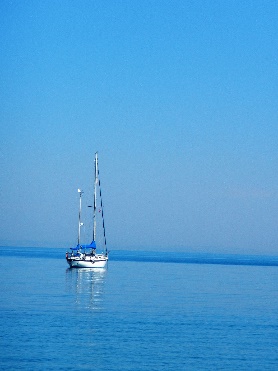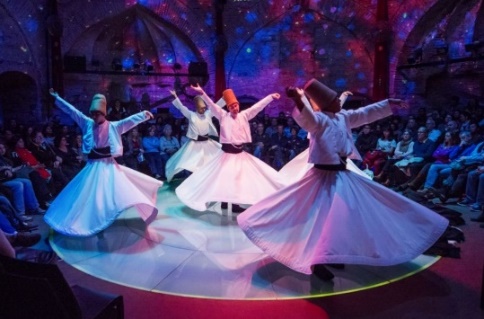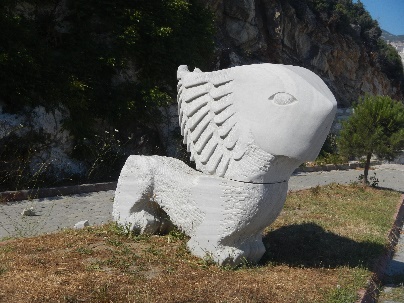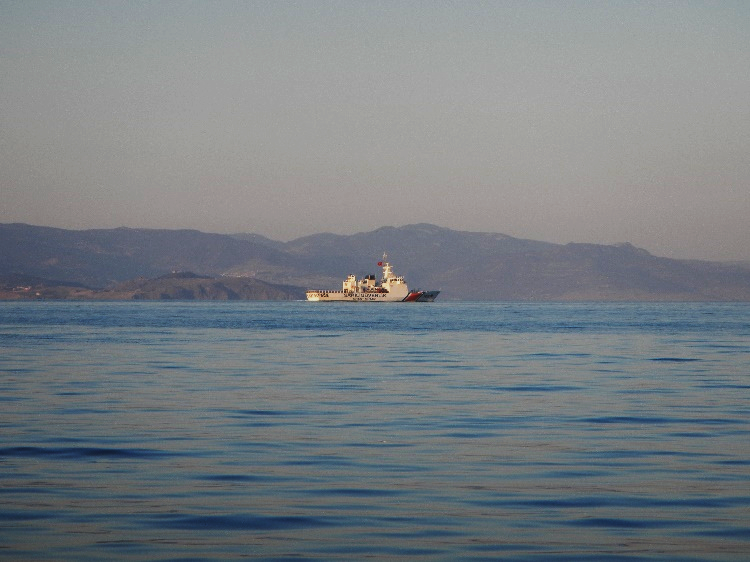June 2017 : Turkish Aegean
LaterEarlier |
After last year’s intrepid adventuring into the Black Sea, the plan this year is for a gentle waft southwards with the wind – our reward for the upwind slog we have endured/enjoyed over the past couple of years. Back out into the Aegean and around the corner of north western Turkey, we’ll then meander through the Greek Dodecanese Islands to Rhodes, before returning to Turkey’s southwest corner to leave the boat in a marina where friends of ours have kept their boat for many years. This is not an ambitious plan and we’re hoping for a trip very much at the idyllic end of the intrepid/idyllic continuum. Turkey is a something of a conundrum - many potential visitors are currently avoiding it because of the terrorist threat. The Foreign Office does not advise avoiding Turkey, though lists terrorist incidents over the past few years. However, recent events in the UK and western Europe demonstrate that safety is not guaranteed anywhere, and other than Istanbul, we are not planning to be in crowded tourist spots – or at the far eastern border. The current regime presents a dilemma as to whether visiting Turkey is colluding with a virtual dictatorship, or supporting the Turks whose tourist-based businesses are falling apart. Our planned route puts us somewhere in between. We arrived back on board Aremiti just after dark at the end of a long convoluted journey from Bristol. By the time we reached the final leg – the ferry from Istanbul to Yalova – it felt like coming home. All seemed well on-board after a winter during which Aremiti has had snow on her deck – apart from flat batteries. There seemed a daunting set of jobs all clamouring to be done first – but order began to emerge from the chaos. A high priority was to sort out internet access – Radio 4 being essential to life – especially during the first couple of weeks of June during the election (yippee!) and other more dire events. We worked away at our cleaning and maintenance chores – to the evident bemusement of the boatyard workers, used to being paid to do such menial tasks by weathly Istanbulite boat owners. However, we did pay to have our hull polished – by a wizened little old man who, it turned out in conversation when Chris was invited to join the workers for chay, was 49!
For most of this month it has been Ramadan, so while still in Yalova, we decided we’d have day experiencing the fast ourselves. The Ramadan fast requires no eating or drinking at all between sunrise and sunset for 28 days. The dates change from year to year and when it occurs over midsummer, it is obviously particularly difficult with long and very hot days. After an abortive first attempt when we could not control our need for water, we succeeded on our second attempt – having got into the mindset – though the final couple of hours were not easy. We assume religious belief helps. At sunset a canon is fired – to be heard throughout the town - and everyone digs in with gusto – often in big parties with friends and family. Our impression was that around 50% of people observed the fast – as exemplified by the two guys working in the marina office, one of whom acted as our ‘mentor’! We have observed generally that Islam appears to be strictly followed by about half the population – mainly the older people and those in more rural areas.
Then out into the Aegean – where the water was immediately perceptibly clearer. First stop was at the island of Bozcaada – second largest of only five Turkish Aegean islands. The island - Tenedos in Ancient Greek – was home of Apollo and the Greek base for the attack on Troy - and behind which the Greeks hid their fleet to trick the Trojans into believing the war was over. The island is known today for its good quality wine and is an enchanting little spot with a very Greek feel to it. We particularly liked the quirky little local history museum there, set up by a collector very much in the same mould as Orhan Pamuk (Museum of Innocence).
The Ayvalik archipelago – an area of about 25 square miles situated on the east side of the Lesbos Strait comprises a number of mainly uninhabited islets creating a virtual lake. There are two small towns - Ayvalik and Alibey. They are in Turkey, but like Bozcaada, show evidence of their previous Greek heritage, with some grand, but dreadfully decaying former Greek houses and churches. The effect of the notorious population exchange between Turkey and Greece in 1923 is very evident in these parts. The archipelago and Aeolian Coast generally are a delightful cruising ground with many anchorages, and we were surprised at how little used by yachts it seemed to be.
Weather conditions during the first half of June were unseasonably cool and blustery and we even had to wear fleeces on some passages – unheard of! However, we are now back to more normal temperatures in the 30s. The pattern of morning calms and windy afternoons has been pretty consistent, except for a mild Meltemi we experienced while in Bozcaada – windy mornings and windier afternoons and evenings. We are trying to fit our sailing round this pattern – though the breeze in anchorages always seems to be stronger than at sea making it difficult to judge when to leave. After a final week of very calm conditions, there are now forecasts of strong Meltemi conditions arriving in the next couple of days. After last year in the Black Sea when we encountered hardly any yachts, we were expecting more here. Not so many yet – though numbers are increasing as we move south - so far all Turkish. We’ve chatted to a few – they all seem to come from Istanbul. We’re still waiting to encounter the first foreign, let alone British yacht. Impressions of Turkey? Industrious and organised people – maybe too much so - concrete estates of identical homes all along the coast are somewhat charmless. Plush and very expensive marinas – the leisure boating industry is burgeoning among the wealthy who can evidently afford the extortionate costs involved. Turkish food is wonderful. The fruit and veg markets are an abundant delight. Restaurant food can be delicious – though not cheap. We are well into meals of mezzes and raki. Despite the bad blood between Turks and Greeks, their cuisine is quite similar.
We have travelled 368 miles this month – a little more than half the distance – as the crow flies – for the whole summer’s plan – but there will be much meandering. Julia, Chris and Aremiti |
 Merhaba from Turkey!
Merhaba from Turkey!  During this phase, we enjoyed a final day of sightseeing in Istanbul – the sprawling
Grand Bazaar, the majestic Suleymaniye Mosque, drinks in a bar overlooking the Bosphorus
and a Whirling Dervishes ceremony – gently trance-like and hypnotic. Security was
evident - a number of rather cursory security checks on public transport and the bazaar
– but quite low key. The atmosphere of the city was calm and benign – in fact possibly
less frenetic and chaotic than it used to be as tourist numbers have been decimated.
During this phase, we enjoyed a final day of sightseeing in Istanbul – the sprawling
Grand Bazaar, the majestic Suleymaniye Mosque, drinks in a bar overlooking the Bosphorus
and a Whirling Dervishes ceremony – gently trance-like and hypnotic. Security was
evident - a number of rather cursory security checks on public transport and the bazaar
– but quite low key. The atmosphere of the city was calm and benign – in fact possibly
less frenetic and chaotic than it used to be as tourist numbers have been decimated.  After around 10 days we set off in a sparkling Aremiti, westwards through the Sea of
Marmara, enjoying a magnificent first day of sailing with spells well over 7 knots –
boding well for the sort of sailing we’re hoping to experience this year. We went first
for a look at the Marmara Islands, the highlight being the port of Sarayler on the north
side of Marmara Island. The whole northern half of the island – its name means marble –
is formed of marble, which has been extracted continuously since ancient times – and is
presumably now a completely different shape! Sarayler is backed by a vast area of marble
quarries, with dusty lorry loads trundling down to the port where the huge chunks of
marble are laboriously loaded on to ships which are arriving and departing all the time.
We’ve never seen so much marble. The foreshore of the port and harbour breakwater are
made entirely of marble and there are modern marble sculptures everywhere – some even
more peculiar than others!
After around 10 days we set off in a sparkling Aremiti, westwards through the Sea of
Marmara, enjoying a magnificent first day of sailing with spells well over 7 knots –
boding well for the sort of sailing we’re hoping to experience this year. We went first
for a look at the Marmara Islands, the highlight being the port of Sarayler on the north
side of Marmara Island. The whole northern half of the island – its name means marble –
is formed of marble, which has been extracted continuously since ancient times – and is
presumably now a completely different shape! Sarayler is backed by a vast area of marble
quarries, with dusty lorry loads trundling down to the port where the huge chunks of
marble are laboriously loaded on to ships which are arriving and departing all the time.
We’ve never seen so much marble. The foreshore of the port and harbour breakwater are
made entirely of marble and there are modern marble sculptures everywhere – some even
more peculiar than others!  After visiting a couple more of the islands we set off early on the 71 mile passage down
the Dardanelles. With an average current of 2 knots sweeping us down, we arrived in a
bay at the southern end where we anchored late afternoon, with a view of the constant
shipping passing in and out of the Dardanelles, under the great Turkish memorial to the
Gallipoli campaign.
After visiting a couple more of the islands we set off early on the 71 mile passage down
the Dardanelles. With an average current of 2 knots sweeping us down, we arrived in a
bay at the southern end where we anchored late afternoon, with a view of the constant
shipping passing in and out of the Dardanelles, under the great Turkish memorial to the
Gallipoli campaign.  Next southwards to the channel which curves between Turkey and the Greek island of
Lesbos. Only five miles wide in places, we weren’t at all sure what to expect – given
the grim news reports of immigrant boats making this crossing a couple of years ago.
However, the area seems now to be tightly patrolled by Turkish coastguard vessels – one
of whose boats came to investigate us at our first anchorage in the channel. We noted
several large radar masts along the coast, a naval vessel on the Greek side, and heard
routine shipping radio announcements urging us to report anything ‘suspicious’ to –
rather bizarrely - a UK phone number. We saw no sign of any immigrants at all.
Next southwards to the channel which curves between Turkey and the Greek island of
Lesbos. Only five miles wide in places, we weren’t at all sure what to expect – given
the grim news reports of immigrant boats making this crossing a couple of years ago.
However, the area seems now to be tightly patrolled by Turkish coastguard vessels – one
of whose boats came to investigate us at our first anchorage in the channel. We noted
several large radar masts along the coast, a naval vessel on the Greek side, and heard
routine shipping radio announcements urging us to report anything ‘suspicious’ to –
rather bizarrely - a UK phone number. We saw no sign of any immigrants at all.  We have kept up with our ancient history with visits to the ancient cities of Assos and
Pergamum. Both perched on hilltops, Assos was founded by colonists from Lesbos nearly
3,000 years ago. Its heyday in 4th century BC came to an abrupt end when it was
conquered by the Persians from which it never really recovered, though St Paul visited
in 56 AD. The mighty 4th century city walls were extraordinarily impressive in their
state of preservation and sheer size. Pergamum was one of the most cultured and
beautiful cities in the Mediterranean world during the Hellenistic and early Roman eras.
We visited the Acropolis with its richly decorated temple (at least what remains after
most went off to a museum in Berlin!). The site of the iconic Library, which rivalled
that of Alexandria in ancient times, was disappointingly hard to envisage – certainly no
sign of the 200,000 volumes! We were astounded by the terrifying steepness of the
Theatre - the top so far from the stage that it must have been difficult to see, never
mind hear what was going on – even if not totally overcome by vertigo. The Asklepion
nearby has the ruins of a fascinating Roman medical centre where Galen carried out his
work. Treatment there apparently included dream therapy, as well as a lot of bathing and
resting.
We have kept up with our ancient history with visits to the ancient cities of Assos and
Pergamum. Both perched on hilltops, Assos was founded by colonists from Lesbos nearly
3,000 years ago. Its heyday in 4th century BC came to an abrupt end when it was
conquered by the Persians from which it never really recovered, though St Paul visited
in 56 AD. The mighty 4th century city walls were extraordinarily impressive in their
state of preservation and sheer size. Pergamum was one of the most cultured and
beautiful cities in the Mediterranean world during the Hellenistic and early Roman eras.
We visited the Acropolis with its richly decorated temple (at least what remains after
most went off to a museum in Berlin!). The site of the iconic Library, which rivalled
that of Alexandria in ancient times, was disappointingly hard to envisage – certainly no
sign of the 200,000 volumes! We were astounded by the terrifying steepness of the
Theatre - the top so far from the stage that it must have been difficult to see, never
mind hear what was going on – even if not totally overcome by vertigo. The Asklepion
nearby has the ruins of a fascinating Roman medical centre where Galen carried out his
work. Treatment there apparently included dream therapy, as well as a lot of bathing and
resting.  We found the epitome of the perfect anchorage 20 miles south of Ayvalik, at Bademli:
crystal clear turquoise water, pristine surroundings, quiet, not too many other boats,
and calm weather. Not only that, but also hot springs on the water’s edge – Paradise! We
would loved to have lingered there longer – or forever. But we had places to go …..
First to Foca – a beautifully situated little holiday town whose population in ancient
times were great mariners, founding colonies all over the Mediterranean and Black Seas,
from Marseilles to Samsun, in their great oar powered vessels. Then on to complete our
passage of the Aeolian Coast at Çeşme – a plush tourist resort with chi chi marina to
match. We’re catching up on some provisioning, refuelling, taking on water, etc. etc.
before we clear out of Turkey. The Greek island of Chios beckons – from just 5 miles
across the strait.
We found the epitome of the perfect anchorage 20 miles south of Ayvalik, at Bademli:
crystal clear turquoise water, pristine surroundings, quiet, not too many other boats,
and calm weather. Not only that, but also hot springs on the water’s edge – Paradise! We
would loved to have lingered there longer – or forever. But we had places to go …..
First to Foca – a beautifully situated little holiday town whose population in ancient
times were great mariners, founding colonies all over the Mediterranean and Black Seas,
from Marseilles to Samsun, in their great oar powered vessels. Then on to complete our
passage of the Aeolian Coast at Çeşme – a plush tourist resort with chi chi marina to
match. We’re catching up on some provisioning, refuelling, taking on water, etc. etc.
before we clear out of Turkey. The Greek island of Chios beckons – from just 5 miles
across the strait. 